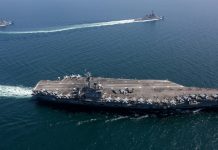
Britain has published a document which reviews aspects of its strategic defense, security and foreign policy as the nation gears up to meet new geopolitical challenges, including those posed by China.
As per that document, Britain intends to increase its stockpile of nuclear warheads and it aims to further invest in bolstering its cyber defenses, artificial intelligence and improve the activities of its space command.
Britain has decided that for now, an increase in fighter jets, ships, aircraft, armored vehicles, and defense personnel is sufficient to meet current challenges. London aims to shore up its financial reserves, which has been depleted with the coronavirus-induced pandemic which emerged from Wuhan, China, while maintaining a strategic defense outlook to mitigate current challenges.
According to Howard Wheeldon, from Wheeldon Strategic Advisory, this is a new beginning and “a great document full of intentions and hopes.”
The document also calls for strengthening of industrial cooperation with the local defense industry. To this end, Britain aims to reduce its participation in “default competition” programs materially. The move has been backed by lawmakers with Paul Everitt saying, this is the right approach that will support local industry.
Nuclear capabilities
A few decades ago, London has agreed to reduce its stockpile of nuclear missiles to 180, which was supposed to take place by the middle of 2020. However, dynamics introduced by Brexit, source of the COVID-19 pandemic pandemic, cyber attacks from state-backed actors, espionage through 5G has paved the way for an increase in British nuclear arsenal. As a result, Britain expects to increase its nuclear capabilities to at least 260 nuclear warheads in the near future.
The review of the new Defense, Security, and Foreign Policy says that some countries “significantly increase and diversify their nuclear arsenals. They invest in new nuclear technologies and develop new” combat “nuclear systems that integrate into their military strategies and doctrines and in their political rhetoric to try to force others.”
In coming years, Britain is also set to replace its Vanguard submarines with the newer Dreadnought-class submarines, which can carry newer nuclear warheads; this class of nuclear submarines are being developed intensively in Great Britain.
According to the British Ministry of Defense, the construction of the Dreadnought class’s first submarine is going according to plan and budget.




